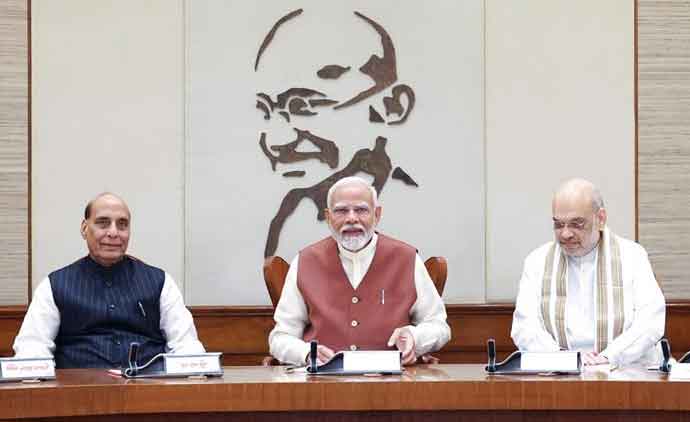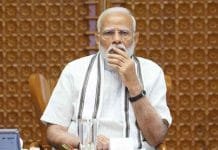INVC NEWS New Delhi — As dawn breaks over South Asia, India stands on the brink of a decisive response to the April 22 terror attack in Pahalgam, which left the nation stunned and outraged. The gravity of the situation has triggered unprecedented security and strategic deliberations, indicating that the countdown to a retaliatory strike is not only underway—it is accelerating with a calculated urgency not witnessed since 1971.
Top-Level Strategic Meetings Signal Imminent Action
Prime Minister Narendra Modi convened a series of high-level meetings this week, bringing together the country’s top national security and defense leadership. On Monday, May 5, PM Modi held emergency strategy sessions with National Security Advisor Ajit Doval, Defence Secretary Rajesh Kumar Singh, and Home Secretary Ajay Bhalla. These high-stakes deliberations focused on concrete military options against Pakistan’s deep-state apparatus, which India blames for orchestrating the deadly Pahalgam ambush.
The discussions followed crucial one-on-one briefings with Air Chief Marshal AP Singh and Navy Chief Admiral Dinesh K Tripathi over the weekend. The sequence of these meetings reveals a layered strategy being finalized, involving potential multi-domain operations across air, land, and water.
India Chokes Chenab River Flow: Hydrological Pressure Begins
In a calibrated escalation, India has reportedly reduced water flows in the Chenab River—a move that could have far-reaching economic and agricultural consequences for Pakistan. Officials confirmed that sluice gates at the Salal and Baglihar dams in Reasi and Ramban were closed post-desalination, reducing downstream flow below waist level for the first time in over a decade.
The Indus River System Authority (IRSA) in Pakistan has issued a red alert, estimating a 21 percent water shortfall for the early Kharif season. Fields that depend on the Chenab inflow at Marala Headworks now face imminent drought-like conditions, further tightening the noose on Islamabad’s strategic depth.
First Time Since 1971: States Ordered to Conduct Full-Scale Safety Drills
In a historic first since the 1971 India-Pakistan War, the Ministry of Home Affairs has directed northern and western states—including Jammu & Kashmir, Punjab, Rajasthan, and Haryana—to conduct civil defense exercises on May 7. These drills will feature:
Mock air raid protocols
Siren and blackout procedures
Rapid evacuation simulations
Public training in emergency shelter and response
The scale of preparation suggests New Delhi is anticipating retaliation and aims to ensure public readiness in the event of aerial or missile strikes. Analysts compare this mobilization to none other than Operation Parakram in 2001-02, though the present scope surpasses even that.
UNSC Holds Emergency Consultations Amid Global Anxiety
Late on Monday, the United Nations Security Council convened in closed-door consultations, prompted by escalating tensions between the two nuclear-armed nations. Pakistan, a non-permanent member, requested the session after UN Secretary-General António Guterres described the standoff as “the most severe since Balakot in 2019.“
Diplomatic sources confirm that several nations, including the United States, Russia, and France, are urging restraint while privately acknowledging India’s right to self-defense under Article 51 of the UN Charter.
Government Tightens National Cyber and Satcom Security
Amid rising national security concerns, the Indian government has imposed stringent new rules on satellite communication (satcom) providers. All providers must:
Obtain mandatory national security clearance
Ensure legal interception capability
Build at least 20% indigenous infrastructure
Avoid data routing or processing via foreign territories
This move is targeted at global players like Starlink, OneWeb, and Jio Satellite Communications, who must now redesign operations to conform to India’s sovereignty and cyber integrity protocols.
Supreme Court Cracks Down on Judicial Delays
The Supreme Court of India has pulled up High Court judges for excessively delaying verdicts, calling such practices a “violation of fundamental rights.” A bench led by Chief Justice DY Chandrachud directed registrars general of all 25 high courts to report:
Cases reserved before January 31, 2025
Delays exceeding one year
Pending judgment status without explanation
The directive sparked immediate action. Notably, the Jharkhand High Court delivered two long-pending verdicts the same day, indicating a judicial chain reaction is underway.
Israel Approves Ground Offensive and Population Relocation in Gaza
In the Middle East, tensions escalated as Israel’s security cabinet approved an expanded ground campaign in Gaza, with plans to relocate 2.1 million civilians for “protection purposes.” Prime Minister Benjamin Netanyahu announced a “forceful, long-term military operation” to destroy Hamas’s remaining infrastructure and secure the release of hostages.
Israeli Defense Forces (IDF) are expected to maintain ground control, marking a shift from previous limited incursions to territorial hold strategies reminiscent of 2006’s Lebanon war.
China’s Sixth-Generation Fighter: Strategic Game-Changer
In a development with global military implications, Chinese defense publications revealed details of a sixth-generation stealth fighter jet, dubbed the J-36. Claimed capabilities include:
Blocking airspace from 1,000 km range
Electronic jamming of enemy radars
Disrupting US military assets in Guam
Analysts believe the J-36 is designed to counteract US bombers like the B-21 Raider, effectively reshaping air superiority dynamics in the western Pacific, particularly around Taiwan.
From the States: Political Realignments and Sectarian Tensions
Mamata Banerjee Downplays Islamist Violence in Murshidabad
West Bengal Chief Minister Mamata Banerjee, facing criticism over the state’s communal riots in Murshidabad, blamed the central government and alleged a “larger conspiracy” behind the violence. Her comments sought to deflect attention from Islamist mobs, which targeted Hindu communities under the cover of sectarian unrest.
Banerjee accused media outlets and the NHRC of bias and claimed the BJP relocated victims to undermine her planned visits. Meanwhile, critics say her administration’s stance on Waqf laws and reluctance to act against radical clerics has emboldened extremism.
BJD Power Play: Patnaik Sidelining Internal Dissent
In Odisha, former CM Naveen Patnaik restructured the BJD’s Political Affairs Committee, a move seen as a response to growing intra-party dissatisfaction. The reshuffle:
Promotes loyalists like Sasmit Patra and Pranab Prakash Das
Marginalizes critics of V K Pandian, Patnaik’s former secretary
Assigns senior leaders like Prasanna Acharya to ceremonial posts
The internal shake-up suggests Patnaik is consolidating control while neutralizing dissenters who question Pandian’s influence on party decisions.
Conclusion: The Nation Awaits with Bated Breath
As we write, India stands poised at a critical juncture. With military preparations nearing completion, diplomatic channels narrowing, and public safety measures reaching Cold War-era readiness, the next 72 hours may reshape not just Indo-Pak relations, but the broader geopolitical chessboard.
All eyes now remain fixed on Prime Minister Modi’s next move, which could redefine regional security doctrines and signal a new phase in India’s counter-terrorism strategy.
















